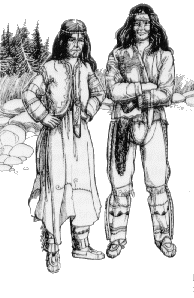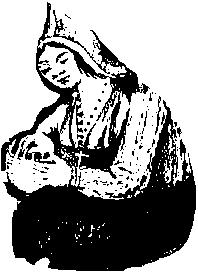

As in most hunter-gatherer societies, the Mi’kmaq men hunted and fished and made the tools they required to do so. Social importance was placed on this; a male was not considered an adult until he had killed his first moose. The Mi’kmaq society was patriarchal- that is, the leaders were men and lineage was traced through the father. Because of this men enjoyed certain privileges that women did not, such as the allowance to speak in front of the kji-saqama. In spite of this, it seems that the Mi’kmaq society differed from most patriarchies in that women were not considered “lesser” than men- simply different.
* * *

Women in Mi’kmaq society were the gatherers. They transported game and materials back to the village, prepared and preserved food, cared for children, and fetched water. In addition they, like their menfolk, made the tools that enabled them to do so- kettles, baskets, dishes, et cetera- as well as blankets and clothing. Certain roles in society were prohibited to them, such as the sacred occupation of drummer or pipe-bearer.
In old European societies- and, to a degree, society today- the man’s role was celebrated and considered very important, while the woman’s role was scorned. This did not apply to the Mi’kmaq. The tasks were not, on the whole, divided to discriminate but to make life easier for everyone; “women’s work” was not looked down upon as the work of a weaker sex. In fact, a European named Samuel Hearne quotes his Mi’kmaw companion Matonabbee as saying:
“Women were made for labor, one of them can carry, or haul as much as two men can do... there is no such thing as traveling any considerable distance, or for any length of time, in this country without their assistance.”
This implies that the Mi’kmaq’s concept of femininity was very different from the European’s ideal of the wilting maiden. Similarly, their concept of masculinity was a far cry from the cherished “macho” image. The ideal leader- always a male- was to be not only an excellent hunter but compassionate and intelligent. Although the Mi’kmaq divided tasks by sex, they didn’t subscribe to the gender stereotypes that so often follow that division.